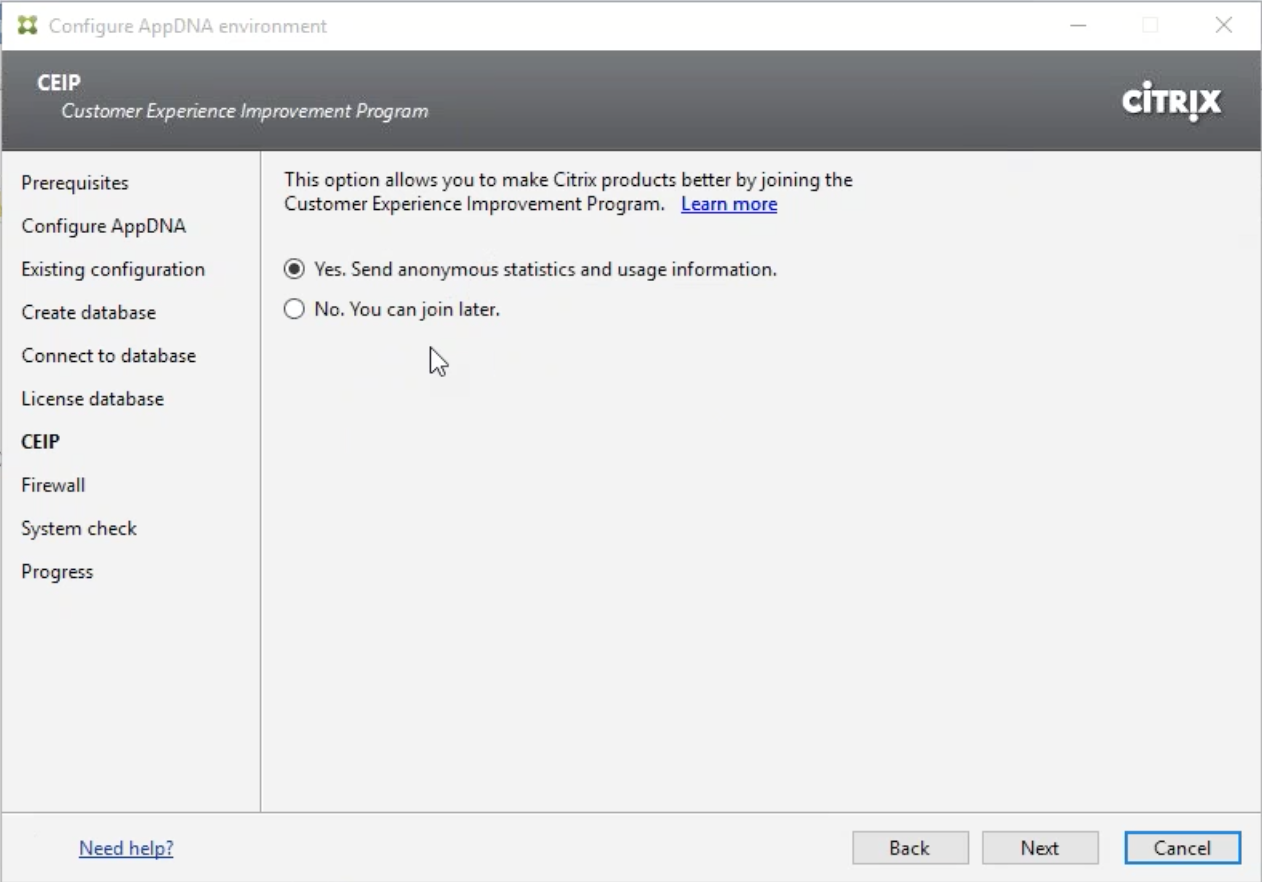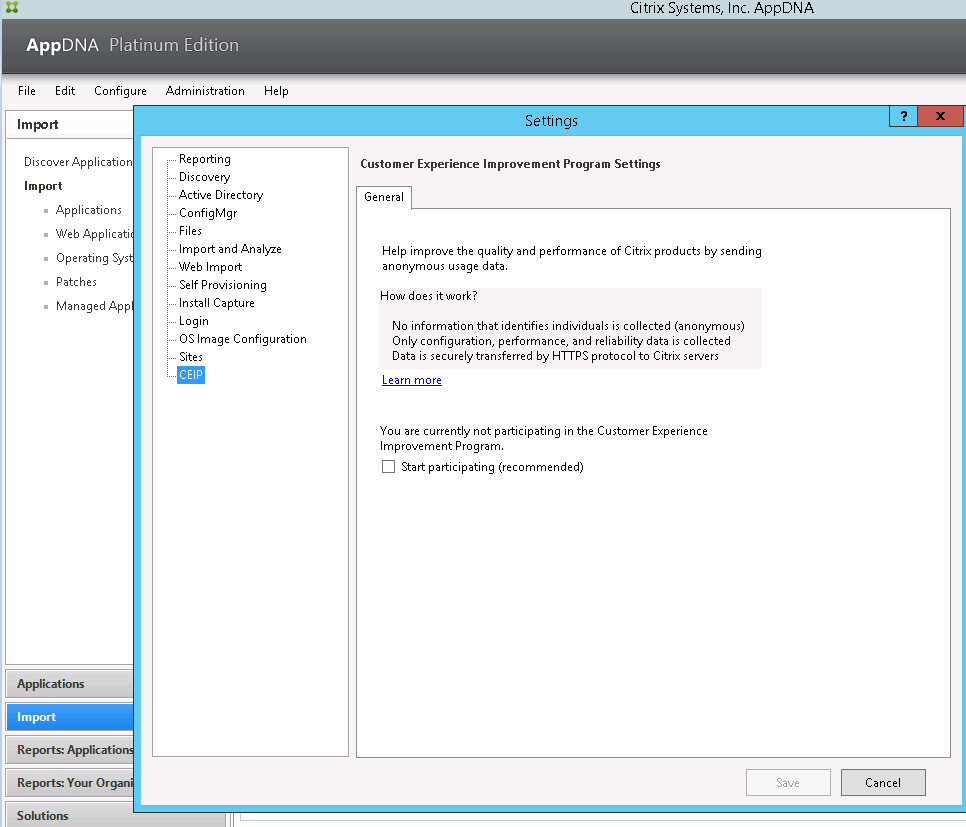CEIP
Aug 14, 2017
The Citrix Customer Experience Improvement Program (CEIP) gathers anonymous configuration and usage data from AppDNA and automatically sends the data to Citrix. This data helps Citrix improve the quality, reliability, and performance of AppDNA. Participation in the CEIP is completely voluntary. For more information on CEIP, see About the Citrix Customer Improvement Program (CEIP) on citrix.com and Citrix Insight Services in the XenApp and XenDesktop documentation.
The first time you install AppDNA, or when you do an update, you can enroll in CEIP. Follow the steps provided by the installation Wizard; in the CEIP screen, select the appropriate radio button to either send anonymous statistics and usage information, or join the program at a later time.

If you are already enrolled, the CEIP screen does not appear in the installation Wizard.
By default, this feature is enabled. You can opt out of CEIP at anytime by disabling the feature in the CEIP section of the Settings screen.
To change the CEIP setting select Edit > Settings > CEIP.

CEIP data collected from AppDNA
The following table gives examples of the type of anonymous information collected. The data does not contain any details that identify you as a customer.
| |
|
| Data |
Description |
| Application Counts |
A count of each of the different types of application present in AppDNA. For example, InstallCapture, SelfProvisioning, Web App, App-V, MSI. |
| Client OS |
A string identifying the OS version on which the AppDNA client is running. |
| Server OS |
A string identifying the OS version on which the AppDNA web site is running. |
| SQL Server Version |
A string identifying the SQL Server version hosting the AppDNA Database. |
| Custom OS image count |
A counter specifying how many OS snapshots are present in addition to the default snapshots supplied. |
| Account types |
A count the number of each type of user or account used to access the database. For example, AD linked, Standard, User, Administrator, Custom. |
| Feature usage |
List of strings denoting which features have been accessed. |
| Report usage |
List of strings denoting which reports have been accessed. |
| Solutions |
List of strings denoting which solution templates have been used to create solutions. |
| AppDNA version |
The version number of AppDNA being used. |
The official version of this content is in English. Some of the Citrix documentation content is machine translated for your convenience only. Citrix has no control over machine-translated content, which may contain errors, inaccuracies or unsuitable language. No warranty of any kind, either expressed or implied, is made as to the accuracy, reliability, suitability, or correctness of any translations made from the English original into any other language, or that your Citrix product or service conforms to any machine translated content, and any warranty provided under the applicable end user license agreement or terms of service, or any other agreement with Citrix, that the product or service conforms with any documentation shall not apply to the extent that such documentation has been machine translated. Citrix will not be held responsible for any damage or issues that may arise from using machine-translated content.
DIESER DIENST KANN ÜBERSETZUNGEN ENTHALTEN, DIE VON GOOGLE BEREITGESTELLT WERDEN. GOOGLE LEHNT JEDE AUSDRÜCKLICHE ODER STILLSCHWEIGENDE GEWÄHRLEISTUNG IN BEZUG AUF DIE ÜBERSETZUNGEN AB, EINSCHLIESSLICH JEGLICHER GEWÄHRLEISTUNG DER GENAUIGKEIT, ZUVERLÄSSIGKEIT UND JEGLICHER STILLSCHWEIGENDEN GEWÄHRLEISTUNG DER MARKTGÄNGIGKEIT, DER EIGNUNG FÜR EINEN BESTIMMTEN ZWECK UND DER NICHTVERLETZUNG VON RECHTEN DRITTER.
CE SERVICE PEUT CONTENIR DES TRADUCTIONS FOURNIES PAR GOOGLE. GOOGLE EXCLUT TOUTE GARANTIE RELATIVE AUX TRADUCTIONS, EXPRESSE OU IMPLICITE, Y COMPRIS TOUTE GARANTIE D'EXACTITUDE, DE FIABILITÉ ET TOUTE GARANTIE IMPLICITE DE QUALITÉ MARCHANDE, D'ADÉQUATION À UN USAGE PARTICULIER ET D'ABSENCE DE CONTREFAÇON.
ESTE SERVICIO PUEDE CONTENER TRADUCCIONES CON TECNOLOGÍA DE GOOGLE. GOOGLE RENUNCIA A TODAS LAS GARANTÍAS RELACIONADAS CON LAS TRADUCCIONES, TANTO IMPLÍCITAS COMO EXPLÍCITAS, INCLUIDAS LAS GARANTÍAS DE EXACTITUD, FIABILIDAD Y OTRAS GARANTÍAS IMPLÍCITAS DE COMERCIABILIDAD, IDONEIDAD PARA UN FIN EN PARTICULAR Y AUSENCIA DE INFRACCIÓN DE DERECHOS.
本服务可能包含由 Google 提供技术支持的翻译。Google 对这些翻译内容不做任何明示或暗示的保证,包括对准确性、可靠性的任何保证以及对适销性、特定用途的适用性和非侵权性的任何暗示保证。
このサービスには、Google が提供する翻訳が含まれている可能性があります。Google は翻訳について、明示的か黙示的かを問わず、精度と信頼性に関するあらゆる保証、および商品性、特定目的への適合性、第三者の権利を侵害しないことに関するあらゆる黙示的保証を含め、一切保証しません。
ESTE SERVIÇO PODE CONTER TRADUÇÕES FORNECIDAS PELO GOOGLE. O GOOGLE SE EXIME DE TODAS AS GARANTIAS RELACIONADAS COM AS TRADUÇÕES, EXPRESSAS OU IMPLÍCITAS, INCLUINDO QUALQUER GARANTIA DE PRECISÃO, CONFIABILIDADE E QUALQUER GARANTIA IMPLÍCITA DE COMERCIALIZAÇÃO, ADEQUAÇÃO A UM PROPÓSITO ESPECÍFICO E NÃO INFRAÇÃO.


 View PDF
View PDF

